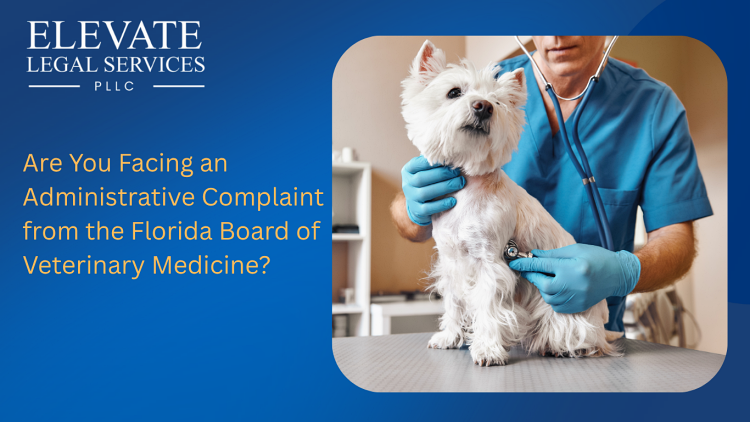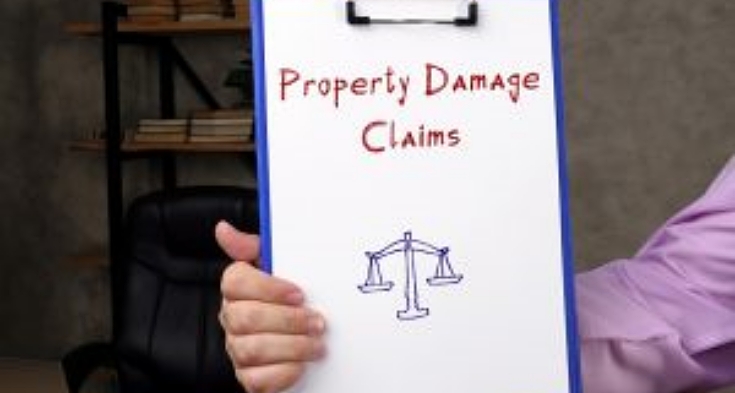
Receiving an administrative complaint from the Florida Board of Veterinary Medicine is stressful. The career you’ve worked so hard to build suddenly feels vulnerable, and the legalese of an Administrative Complaint can be confusing and intimidating.
You’re not alone. With the right guidance, you can understand the process, assert your rights, and protect your career.
Need immediate guidance? Call Elevate Legal Services, PLLCtoday on 877-450-3529 for a confidential consultation, or contact usto speak with an attorney about your case.
By the time you finish reading, you will have a clear understanding of the common violations, the step-by-step DBPR complaint process, the benefits of professional legal representation, and answers to your most pressing questions.
What is an Administrative Complaint?
 The Florida Board of Veterinary Medicine, under the DBPR, oversees veterinarians statewide. When a complaint is filed—whether by a client, colleague, or agency—the DBPR investigates the complaint.
The Florida Board of Veterinary Medicine, under the DBPR, oversees veterinarians statewide. When a complaint is filed—whether by a client, colleague, or agency—the DBPR investigates the complaint.
If probable cause is found, the Board may file a formal administrative complaint against you. These complaints allege violations of F.S. §474.214(1)and can result in fines, probation, suspension, or even revocation of your license.
Here’s what that means legally:even minor allegations can trigger a process that puts your career at risk.
Common Violations Under F.S. §474.214(1)
Veterinarians often face allegations such as:
- Negligence or deviation from standard of care (§474.214(1)(r)): Failing to provide treatment consistent with accepted veterinary standards.
- Fraud, deceit, or misrepresentation (§474.214(1)(ee)): Making false statements during practice or licensing.
- Criminal convictions related to veterinary practice (§474.214(1)(b)): Crimes that directly affect your ability to practice.
- Violations of Board rules or orders (§474.214(1)(jj)): Disregarding directives or failing to comply with regulations.
- Unprofessional conduct (§474.214(1)(u)): Broadly defined actions that undermine public trust, including poor record-keeping or unethical client interactions.
Bottom line:each of these violations carries serious consequences.
Navigating the DBPR Legal Process: A Step-by-Step Guide
The administrative legal system has its own unique procedures. Knowing what to expect can significantly reduce your anxiety and help you make informed decisions.
- The Complaint and Investigation.It all starts when someone files a complaint against you with the DBPR. The complaint is reviewed, and if found to be legally sufficient, an investigator is assigned. The investigator may request medical records, contact you for a statement, or interview witnesses. It is important to consult with an attorney before responding to any inquiries.
- The Probable Cause Panel.After the investigation, the findings are presented to the Board of Veterinary Medicine’s Probable Cause Panel. This panel, typically composed of fellow veterinary professionals, reviews the case in a confidential meeting. Their job is not to determine guilt, but to decide if there is “probable cause” to believe a violation occurred. If they find probable cause, a formal Administrative Complaint is filed.
- The Election of Rights.Once you are served with the Administrative Complaint, the clock starts ticking. You have a limited time (usually 21 days) to file your “Election of Rights” form. This is a critical decision point. You can request a formal hearing to dispute the facts, an informal hearing to argue mitigation before the Board, or you can opt to enter settlement negotiations. An attorney can advise you on the best course of action for your specific case.
- Discovery and Hearings.If you elect a formal hearing, both sides will engage in “discovery”—the process of exchanging information, documents, and witness lists. The hearing itself is like a trial, held before an Administrative Law Judge. Your attorney will present evidence, cross-examine witnesses, and make legal arguments on your behalf.
Why You Need an Experienced Attorney
Trying to handle a DBPRcomplaint on your own is a significant risk. The stakes are simply too high.
Protect Your Rights and Avoid Critical Mistakes
An experienced DBPR defense attorney understands the procedural traps and deadlines. Our team, led by attorneys likeJay Arnesen, ensures your rights are protected from the very start, preventing you from making missteps that could harm your defense.
Strategic Case Analysis and Defense
We don’t just read the complaint; we dissect it. We analyze the evidence, hire expert witnesses when necessary, identify weaknesses in the prosecution’s case, and build a defense strategy tailored to your specific situation.
Skilled Negotiation and Mitigation
Many cases are resolved through settlement. An attorney acts as your advocate, negotiating with the DBPR’s prosecutorto achieve the best possible outcome. This could mean a dismissal, a reduction in charges, or minimizing penalties to protect your license and your ability to practice.
How Elevate Legal Services, PLLC Can Help
At Elevate Legal Services, PLLC, we understand the weight of an administrative complaint.
Our approach is:
- Client-centered:we guide you from the moment you’re notified.
- Clear and practical:we explain each step so you know what to expect.
- Strategic:We build tailored defenses for your unique situation.
- Focused on results:we fight to safeguard your license and reputation.
Learn more about our Professional License Defenseservices.
Frequently Asked Questions (FAQ)
 What is the very first thing I should do if I receive an Administrative Complaint?
What is the very first thing I should do if I receive an Administrative Complaint?
Immediately and carefully read the entire document. Do not ignore it. Then, before you do anything else, contact an attorney who specializes in professional license defense. Do not attempt to contact the DBPR or the Board investigator on your own.
What happens if I just ignore the complaint?
Ignoring the complaint will result in a default action against you. The Board will deem the allegations as admitted and can impose the most severe penalties, including revocation of your license, without you ever having a chance to tell your side of the story.
What are the potential penalties I could be facing?
Penalties vary widely based on the violation but can include letters of warning, fines, probation, required continuing education, practice monitoring, license suspension, or, in the most serious cases, permanent revocation.
Can I handle this myself to save money?
While you have the right to represent yourself, it is highly inadvisable. The financial cost of hiring an attorney is an investment in your career. The potential cost of losing your license and livelihood is infinitely greater. The rules of evidence and administrative procedure are complex and not intuitive.
How long does this entire process usually take?
The timeline for an administrative case can range from several months to over a year. The duration depends on the complexity of the case, the path you choose in your Election of Rights, and the hearing schedule of the administrative court.
Will the complaint become public record?
Initially, the complaint and investigation are confidential. However, if the Probable Cause Panel finds probable cause, the Administrative Complaint and all subsequent proceedings become public record, regardless of the outcome.
Take the First Step to Protect Your Career
Facing an Administrative Complaintis a serious challenge, but it is not one you have to face alone. The decisions you make in the coming days and weeks will have a lasting impact on your professional future. Your license is your most valuable professional asset.
Let us help you protect it.
At Elevate Legal Services, PLLC, we provide aggressive defense. We are ready to listen to your story, answer your questions, and build the strong defense you deserve.
Don’t wait. Call us today at 561-770-3335for a confidential consultation or fill out our online contact form.





